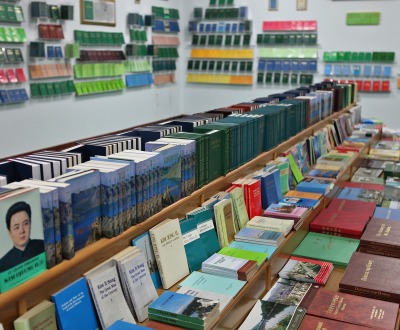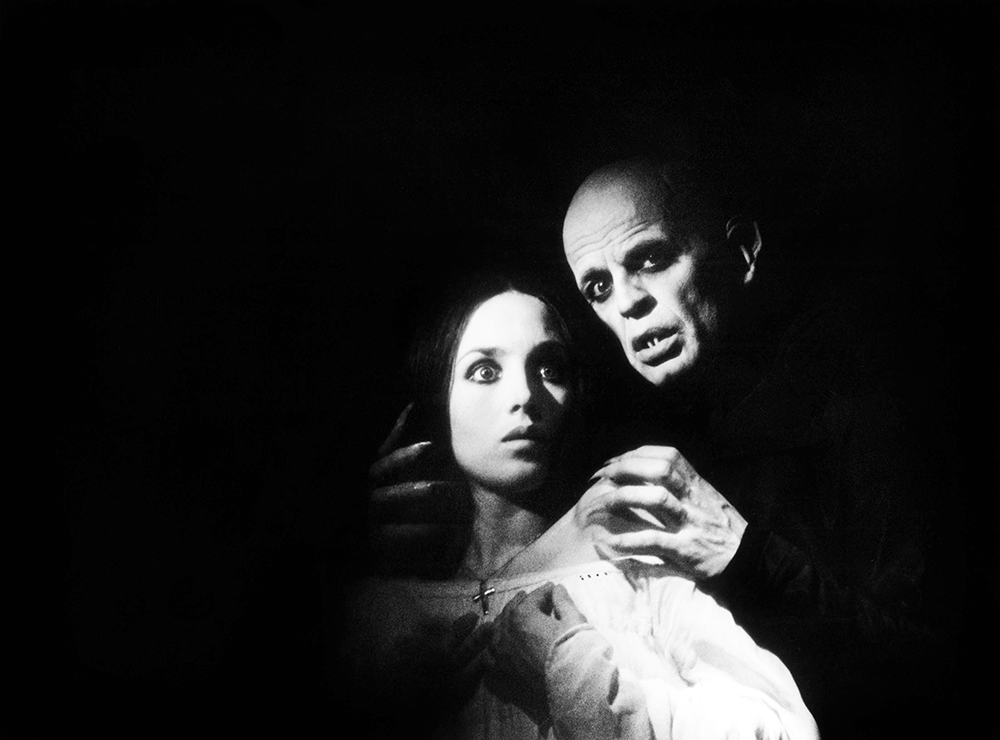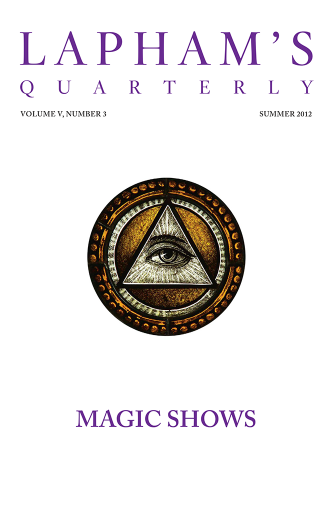The man in constant fear is every day condemned.
—Publilius Syrus, 50 BC
A North Korean bookstore featuring texts written by the country’s leaders, c. 2010.
I am the only writer ever, as far as we know, to have lived undercover in North Korea, embedded within the system to investigate the place. In 2011 I took my fifth trip into Pyongyang, where, under the guise of being a missionary and an ESL teacher, I lived for six months with 270 North Korean males in a military compound. For this act, I am often described as “fearless.” People call me brave. But even if it sounds illogical, I consider myself to be a very fearful person. Even more, I believe my fearfulness is the only way I can begin to explain my time undercover in the gulag nation.
North Korea is perhaps the darkest place in the world. The country lacks electricity; everything is gray and monotone, and the only light is given to the Great Leader, an authoritarian, godlike persona now worn for the third generation by thirty-three-year-old Kim Jong Un, who is considered the sun, though that sun exudes no warmth for its people. No other contemporary country is so entirely devoid of light.
I have always been afraid of the dark. I rarely dream, and I used to sleepwalk as a child to escape the pitch blackness of being asleep. Even now, I cannot turn the light off at night. This is a dreary habit since artificial light is so disruptive that I almost never sleep well. But my fear of the dark is overpowering; I would rather forsake good sleep if it means keeping the darkness at bay.
Morning brings no relief. I often wake with a sinking feeling, then spend many early hours staring at unopened emails with dread, ill at ease with facing a shared territory of interaction. I have even been avoiding emails about this essay, which I’ve been afraid to start for weeks. I disabled the calendar app on my phone so that I would not be reminded of the approaching deadline. I recently had to fly from New York to Seoul, and the reasons for that trip became secondary to the flight itself, which suggested to me a fourteen-hour-long refuge when no one would be able to reach me or expect me to reciprocate.

Scene from a Ghost Story: The Okazaki Cat Demon, by Kuniyoshi, c. 1850. © The Metropolitan Museum of Art, Fletcher Fund, 1929.
I experience the world, that is, as a map of fears to navigate, its coordinates all shattering bits coming at uneven speeds. This feeling has dogged me for as long as I can remember, and the map operates as a knot growing more tangled within me each day. Parts of it—the toughest paths to fathom—have been there for as long as I can recall. One of these paths leads back to North Korea, which often seems to me the dark night from which I have run all my life.
My family was separated by the Korean War, and I was born and raised in South Korea. When I was twelve, my father, who had been a millionaire, suddenly went bankrupt. In the middle of night, I was awakened and shoved into a car and driven to a city far away, to a relative’s house, where I waited for my parents to join me. Because bankruptcy is punishable there by jail, my parents had gone into hiding. I was a child and didn’t understand, so I waited, every day expecting their return. But I didn’t see them again until a year later, at John F. Kennedy Airport, in New York, after our family had fled Korea.
Predictably, I don’t remember much of that year of waiting; that time remains in my mind as a hollow darkness from which the only sensation I recall is that of a thirst, the huge, bottomless kind that cannot be quenched. The darkness did not lift even when I immigrated to America and became reunited with my parents, now penniless. I did not speak a word of English. Everything I knew simply vanished in one instant, and I got stuck, I think, in the shadowy nook where I hid as a girl, aged twelve.
Perhaps because of all this, I am good at waiting. I can wait for days and years, through rain and storm—even through darkness—and hardly ever ask questions. Somewhere deep in my mind, I must imagine that if I am quiet and good, my parents will come back. I could have made, I suppose, a very good wife to a very conservative man. But instead I became a writer in the English language despite, or maybe because of, the fact that English, which I adopted as a teen, was another road on my map of fear.
As I write this, I’m reminded of a well near my childhood home. It was a deep, old-fashioned, cylindrical well made of stone, and the neighborhood kids played around it, throwing things and shouting into its vault to hear the echo. I was always terrified of it and never went near. Later in life I became briefly fixated with the work of Haruki Murakami because he kept using wells as symbols in his novels. But eventually I got bored of reading him; I realized that it wasn’t Murakami’s writing that haunted me but the well from my childhood. My passion for his work was just the flip side of a stronger fear.
How all this relates to North Korea might seem, I realize, abstract. I can’t say it provides direct explanation. Perhaps I traveled to the darkest place on earth because I empathized with its citizens, who are stuck in that darkness and cannot get out. Perhaps their voicelessness became mine because it reminded me of mine. Or it’s possible that North Korea, in some ethereal way, became a kind of darkest night, the longest wait, the well from my childhood.
I pursued coverage of the country for a decade, every step of the way nearly paralyzed with fear. I was not one of those intrepid foreign correspondents who jump into war zones, nor did I have a team of editors, fixers, and photographers working alongside to help figure out the logistics and arrange the precautionary backups. Although I signed a book contract long before 2011—when I finally dove into Pyongyang for those six months—my meager contract was just a piece of paper with a vague deadline, never a support network I could rely on for protection. In Pyongyang I was watched around the clock by the minders who lived directly below me in a dormitory under complete surveillance. My classes were recorded and reported on, and I had to get permission for every lesson from the North Korean staff. I saved my notes on USB sticks, which I kept on my body at all times. I made sure to delete my traces from my laptop every time I signed off. I saved a backup copy on an SD card, which I hid in different spots in the room, always with the light off. I created a document within a document, burying the notes in the middle of what looked like class lesson material. I was utterly on my own and knew no one who could come to my rescue if I were caught with the four hundred pages of notes I had taken in secret. The most likely scenario was that I would vanish in that bleak, dark unknown.
North Korea is the most inaccessible country in the world, and its regime has committed human rights abuses at a scale, according to the United Nations, “without parallel in the contemporary world.” It is a society built entirely on fears. Its dictators have manipulated and exploited human frailties to incorporate them into its system of control and abuse. Its citizens cannot leave the country, and their movement within it is restricted. Information is censored, and every interaction is surveilled. Education is only about the cult of the Great Leader, as is the media, and the citizens are treated as slaves and soldiers to uphold the myth. Those who enter its borders without permission or who commit acts that are forbidden by the regime—even something as seemingly innocuous as ripping a poster of their Great Leader—can face sentences of more than a decade of hard labor. Public execution is sanctioned by the regime, which is also known for kidnapping foreigners. No one with any sense of self-preservation would sneak into North Korea to write a book.
This leads people back home in the United States, or in South Korea or Europe, where I’ve traveled in recent years to give talks—the same people who like to call me fearless and brave—to ask the inevitable questions: Wasn’t I scared? And why did I go?
These questions always give me pause. Perhaps it is a natural human instinct to look for a neat, rational motive for any story that seems incredible. Readers often want to identify with their narrator and the reasons for her action, or perhaps they just want to be assured that the author of a story is not out of her mind. Some years ago, when I published my first novel, there were readers who seemed to take personal offense at the story being open-ended. A few even told me I should write a sequel to redo the ending with a proper conclusion.
Yet such an instinct is self-defeating; no true story worth anyone’s time operates according to a predictable pattern. Accepted plots are almost always contrived. It is entirely possible to be scared and not scared at the same time, though this idea is rarely allowed. Such a blurred line reminds us how limited our agency is to control our circumstances; this mathematics of fear leaves no such gray area. In our attempt to be satisfied with a story’s arc, we like to limit ourselves to a one-dimensional narrative of a hero fighting evil, although we know that life is almost always somewhere in between.

Isabelle Adjani and Klaus Kinski in a scene from Nosferatu the Vampyre, directed by Werner Herzog, 1979. © Bridgeman Images.
One of the questions I am most frequently asked about North Korea is whether the people there are “brainwashed under their Great Leader.” The question strikes me as deeply patronizing; citizens there are not simplistic robots. They may believe and not believe all at once. My North Korean students would, in unison, swear against the imperialist America and its puppet South Korea as their chief enemies and say that if a war broke out, they would kill their enemies without hesitation. But when I asked them, “What about me? I’m both South Korean and American,” they looked embarrassed and laughed shyly, mumbling, “But you are our teacher. You are different.”
Isn’t this the kind of paradox by which the human mind works? There is a place in our being that allows for simultaneous belief in something while knowing it not to be true—or for calmly speaking with students in a classroom while experiencing absolute terror about the consequences of being found out by authorities. I think of it as a kind of blind spot.
Despite the differences in circumstances in America, we have seen plenty of examples of the blind spot operating through the recent election cycle. It appears that an overwhelming sector of the population became convinced that a real-estate guy who played a boss firing people for eleven years on a popular reality TV show was uniquely qualified to lead the nation. Even in this country, where celebrity prestige seems to dictate the public conscience, it cannot be that people would confuse playing the boss on television with having anything to do with being the actual boss of a nation—but perhaps such was the comfort of indoctrinated habit. It’s of a piece with an American psychology that has allowed joking about the Great Leader to be our cultural norm. Movies like the animated Team America: World Police and the comedy The Interview are among the most popular reference points for North Korea; a country where 25 million people are currently being trapped and tortured has largely been figured into American mainstream culture as the butt of jokes.
Every time someone in an audience asks me how and whether all North Koreans are brainwashed, I am struck by how unintelligible such a question is, and how much it assumes a fundamental difference between the operations of their own minds and the minds of North Koreans. I often feel I am watching an object of fear grow to dominate the audience member’s brain and arrest their understanding. Perhaps there is a comfort in denying North Koreans their humanity, distancing their experiences as unreal. To do so allows us to have no obligation and responsibility to them, and it frees us from the vague sense of our complicity. They cannot touch us. The blind spot allows a person in such a situation to feign an act of agency that masks a deeper lack of agency; it is at once willful ignorance and knee-jerk self-protection.
Each time someone calls me fearless, I think of this blind spot, as I believe it helps explain my time in North Korea. I do not mean to suggest that I was naive to its dangers, but that each time I thought about being caught, I blocked the matching pangs of fear that came, attempted to usher them away from the front of my consciousness as well as I could.
In Pyongyang I was allowed to leave the campus only in a group with minders for a few hours on weekends, and my days were meticulously mapped out, so the only break I got was to jog in a circle around the tiny campus. I wore the mini USB sticks containing the notes for my book on a necklace as pendants, and I always feared that the strand might loosen and slip off me while I was not paying attention. In those passing moments, when the possibility of being discovered struck me as an impending, inevitable doom, my breath would catch, and as a kind of survival mechanism, I would shut my eyes and push away the thought.
It often seems to me that the desire to comprehend fear strikes at a mystery at the center of life. We breathe toward death; each moment alive is a clock tick toward not living any longer. There is no happy ending, and to help all this make sense to us, we repeat histories, fight needless wars, recite prayers, and fall in love, often more than once, with people who will break our hearts. Life is born from those blind spots, with each mishap, every accident.
Because I identify with fear, I turned out to be, as much as one can be, well suited to pursue North Korea and to bear each frightening day there as if I were a researcher at a laboratory working on a case. I did not count on caring so much for my students, but I did, and that consequence was afforded to me by my own blind spot. Each interaction surprised me, shocked me from unknowing to knowing, gave me names and faces toward a deeper understanding of the North Korean horror. The dark stopped being dark for one illuminating second at a time, and even if night returned each time to blacken the sky completely, the darkness that followed was never quite the same.
I wants to make your flesh creep.
—Charles Dickens, 1837There is no full circle, tidy conclusion, or simple solution to any of this. I am still scared of North Korea. My inbox is full of unread emails. Mornings are hard, and I try to avoid reading breaking news from above the thirty-eighth parallel, which is inevitably negative; two Americans from the school where I was undercover are being held hostage by the regime. When I finally do glance at the news, I don’t look at photos because I am afraid that I might see the faces of my students, which would make me tumble and lose my precarious balance.
Sometimes I still fear that it will all come to haunt me one day, that someone sent by the Great Leader will find me while I am traveling somewhere far away from home, and that I will either be taken back to Pyongyang or be punished for writing about what they did not want revealed. But each time my mind goes there, I stop myself, and though it is not clear where my thoughts retract to, there is often a lull; for a brief moment I am numb, and fear cannot get to me.
